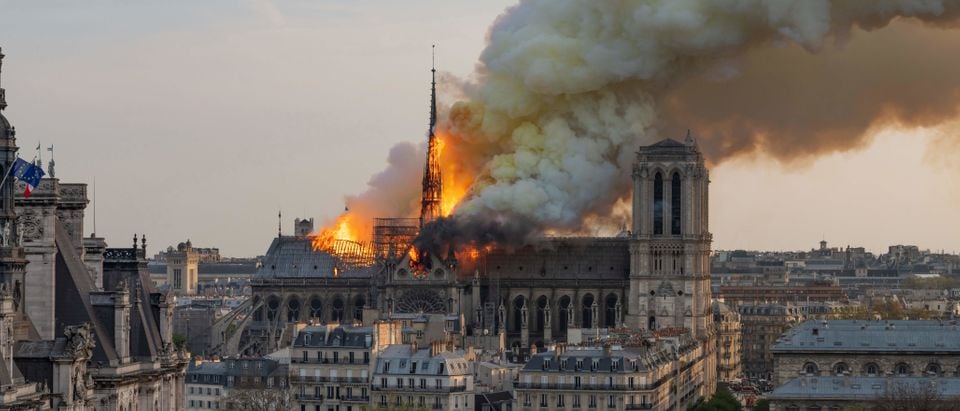I remember reading, many years ago, the description of a “lady of leisure,” an heiress perhaps, languidly draped across her couch reading the works of the Spanish mystic and ascetic, St. John of the Cross, while popping expensive chocolates in her mouth. “Marvelous, marvelous,” she exclaimed, as she reached decorously for the next sugary treat.
That image came to mind when listening to a certain kind of conservative, either in the sheltered world of academia or punditry, (not too many shelters left), discourse on the current culture of intolerance, violence and suppression of speech. The refrain seems to be “we’ve seen it all before, this too shall pass.” We have indeed seen it all before, and it always ended badly for Christians — in the “Great Terror” of the French Revolution and in the persecution caused by the twin evils of Nazism and Communism.
In France, according to the sadly essential organizatio, the Observatory On Intolerance and Discrimination Against Christians in Europe (OIDACE), attacks on Christian churches are running at approximately two incidents a day. This is anything from minor vandalism, desecrations and robberies, to arson. Just this week, Nantes Cathedral was subject to an arson attack which, although not damaging the cathedral to the extent of Notre Dame in Paris, destroyed the organ which had survived both the French Revolution and two World Wars. According to official figures published by the French Interior Ministry, and obtained by the Observatory, there has been a 25% increase in attacks since 2008, with those attacks accelerating since 2015. These recorded incidents do not, of course, include the “unsolved mysteries” of spontaneous fires in churches, caused by “electrical faults,” mice or other convincing reasons. There is still no confirmed explanation for the destructive fire at Notre Dame.
Ellen Fantini, the director of the Observatory, tells me that most European governments do not publish figures for anti-Christian incidents but, in her opinion, such incidents are on the rise across Europe and she expects them to get much worse, with specifically Antifa and other extreme Left groups targeting Christian buildings and symbols.
Interestingly, while anti-Christian and anti-Semitic incidents have sharply increased across Europe and especially in France, Interior Ministry figures for France indicate that anti-Muslim attacks are at their lowest since 2010.
Tragically, as seen at Nantes Cathedral, it appears that government resources are not being used to protect Christian sites, even though they are statistically more vulnerable.
Although the motivation for the Nantes Cathedral arson attack is not clear at the moment, each attack in Europe or the US, whether by Islamist radicals, satanists, Antifa and other extremists, is characterized by a hatred for all that these buildings symbolize.
The hatred of radical Islam for both the buildings and all they represent, and for the people who worship within them, might be easier to understand. I remember vividly walking around the graveyard of a Chaldean Catholic Church in the town of Karamles, on the Nineveh Plain in Iraq in 2017. Just a few miles from Mosul, coalition bombing could be heard in the distance. Karamles had recently been liberated and not only had the Church been burned and desecrated, with all the statues destroyed and every image of the Cross vandalized or pockmarked with bullet holes, but even in the graveyard the Christian bodies had been dug up by ISIS and thrown away. The Pastor, Fr. Thabet, explained to me that ISIS was attempting to not only destroy the Christian history and presence in Iraq, but to deny it had ever existed.
The aim of the radical left and those who are attacking Christian churches and symbols in Europe and increasingly now in the United States is, essentially, the same. It is a repudiation of Christian civilization, a denial of its validity and an attempt to wipe away all traces of that civilization. I remember asking a friend, an Iraqi Christian whose own family in the space of three generations had been exiled three times, why this peculiar marriage between radical Islam and the radical left existed? Very quietly she said to me that “they both have the same enemy — the Church.”
While European churches burn and daily attacks take place on Christian sites and symbols, the most troubling and curious phenomenon is the almost total silence of the Church and its hierarchy. With a few notable exceptions, including the impressive Archbishop of Paris, Michel Aupetit, both a medical doctor and priest, there is barely a mention of the wave of attacks and their increasing frequency.
Silence, it is often said, equals consent; perhaps in this case it might be cowardice and the ubiquitous fear of various phobias, both real and imagined. Age-old Christian dogma teaches both the right to legitimate self-defense and the right to defend personal property. It also teaches the rule of law. Christians do not have to watch Christian civilization burn down.
In late 2014, the former Archbishop of Mosul, Amel Nona, stunned the few people who were able to read his words. They are applicable to both the Islamists and the extreme left who are burning and destroying. He wrote: “Our sufferings today are the prelude of those you, Europeans and Western Christians, will also suffer. Please try to understand us. Your liberal and democratic principles are worth nothing.” Hilaire Belloc, perhaps the first truly revisionist historian, at least in terms of English Catholic history, once wrote that, “either Europe will return to the Faith, or she will perish.” While it is certainly possible to disagree with that prophecy, it might be worth asking, what is the alternative?
Fr. Benedict Kiely is the Founder of Nasarean.org, a charity aiding and advocating for persecuted Christians


